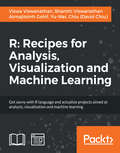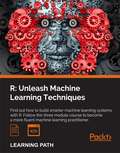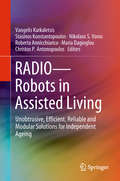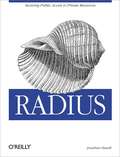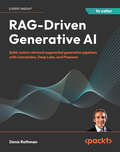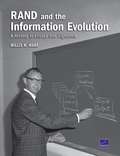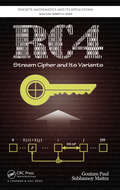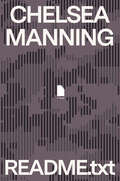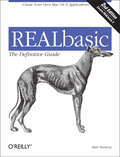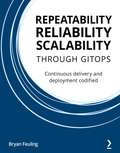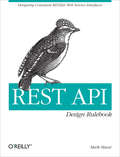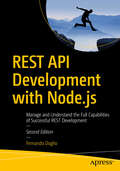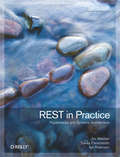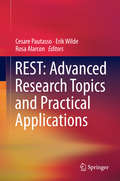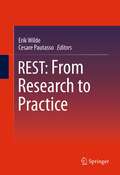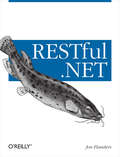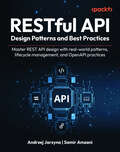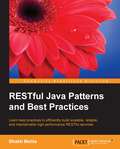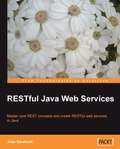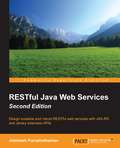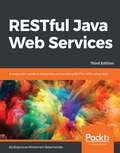- Table View
- List View
R: Recipes for Analysis, Visualization and Machine Learning
by Atmajitsinh Gohil Yu-Wei Chiu Shanthi Viswanathan Viswa ViswanathanGet savvy with R language and actualize projects aimed at analysis, visualization and machine learning About This Book * Proficiently analyze data and apply machine learning techniques * Generate visualizations, develop interactive visualizations and applications to understand various data exploratory functions in R * Construct a predictive model by using a variety of machine learning packages Who This Book Is For This Learning Path is ideal for those who have been exposed to R, but have not used it extensively yet. It covers the basics of using R and is written for new and intermediate R users interested in learning. This Learning Path also provides in-depth insights into professional techniques for analysis, visualization, and machine learning with R - it will help you increase your R expertise, regardless of your level of experience. What You Will Learn * Get data into your R environment and prepare it for analysis * Perform exploratory data analyses and generate meaningful visualizations of the data * Generate various plots in R using the basic R plotting techniques * Create presentations and learn the basics of creating apps in R for your audience * Create and inspect the transaction dataset, performing association analysis with the Apriori algorithm * Visualize associations in various graph formats and find frequent itemset using the ECLAT algorithm * Build, tune, and evaluate predictive models with different machine learning packages * Incorporate R and Hadoop to solve machine learning problems on big data In Detail The R language is a powerful, open source, functional programming language. At its core, R is a statistical programming language that provides impressive tools to analyze data and create high-level graphics. This Learning Path is chock-full of recipes. Literally! It aims to excite you with awesome projects focused on analysis, visualization, and machine learning. We'll start off with data analysis - this will show you ways to use R to generate professional analysis reports. We'll then move on to visualizing our data - this provides you with all the guidance needed to get comfortable with data visualization with R. Finally, we'll move into the world of machine learning - this introduces you to data classification, regression, clustering, association rule mining, and dimension reduction. This Learning Path combines some of the best that Packt has to offer in one complete, curated package. It includes content from the following Packt products: * R Data Analysis Cookbook by Viswa Viswanathan and Shanthi Viswanathan * R Data Visualization Cookbook by Atmajitsinh Gohil * Machine Learning with R Cookbook by Yu-Wei, Chiu (David Chiu) Style and approach This course creates a smooth learning path that will teach you how to analyze data and create stunning visualizations. The step-by-step instructions provided for each recipe in this comprehensive Learning Path will show you how to create machine learning projects with R.
R: Unleash Machine Learning Techniques
by Brett Lantz Raghav Bali Dipanjan Sarkar Cory LesmeisterFind out how to build smarter machine learning systems with R. Follow this three module course to become a more fluent machine learning practitioner. About This Book * Build your confidence with R and find out how to solve a huge range of data-related problems * Get to grips with some of the most important machine learning techniques being used by data scientists and analysts across industries today * Don't just learn - apply your knowledge by following featured practical projects covering everything from financial modeling to social media analysis Who This Book Is For Aimed for intermediate-to-advanced people (especially data scientist) who are already into the field of data science What You Will Learn * Get to grips with R techniques to clean and prepare your data for analysis, and visualize your results * Implement R machine learning algorithms from scratch and be amazed to see the algorithms in action * Solve interesting real-world problems using machine learning and R as the journey unfolds * Write reusable code and build complete machine learning systems from the ground up * Learn specialized machine learning techniques for text mining, social network data, big data, and more * Discover the different types of machine learning models and learn which is best to meet your data needs and solve your analysis problems * Evaluate and improve the performance of machine learning models * Learn specialized machine learning techniques for text mining, social network data, big data, and more In Detail R is the established language of data analysts and statisticians around the world. And you shouldn't be afraid to use it... This Learning Path will take you through the fundamentals of R and demonstrate how to use the language to solve a diverse range of challenges through machine learning. Accessible yet comprehensive, it provides you with everything you need to become more a more fluent data professional, and more confident with R. In the first module you'll get to grips with the fundamentals of R. This means you'll be taking a look at some of the details of how the language works, before seeing how to put your knowledge into practice to build some simple machine learning projects that could prove useful for a range of real world problems. For the following two modules we'll begin to investigate machine learning algorithms in more detail. To build upon the basics, you'll get to work on three different projects that will test your skills. Covering some of the most important algorithms and featuring some of the most popular R packages, they're all focused on solving real problems in different areas, ranging from finance to social media. This Learning Path has been curated from three Packt products: * R Machine Learning By Example By Raghav Bali, Dipanjan Sarkar * Machine Learning with R Learning - Second Edition By Brett Lantz * Mastering Machine Learning with R By Cory Lesmeister Style and approach This is an enticing learning path that starts from the very basics to gradually pick up pace as the story unfolds. Each concept is first defined in the larger context of things succinctly, followed by a detailed explanation of their application. Each topic is explained with the help of a project that solves a real-world problem involving hands-on work thus giving you a deep insight into the world of machine learning.
RADIO--Robots in Assisted Living: Unobtrusive, Efficient, Reliable and Modular Solutions for Independent Ageing
by Nikolaos S. Voros Christos P. Antonopoulos Vangelis Karkaletsis Stasinos Konstantopoulos Roberta Annicchiarico Maria DagioglouThis book describes a unique approach to bring robotic technology into elders’ daily lives. Low cost components and low cost robotic assistants are effectively combined to offer high quality services to elders and people in need. The book presents in a comprehensive way how technology can be used for developing a new healthcare paradigm where high quality services are offered at home, thus reducing the ever-increasing hospitalization cost of the elders and the people with chronic diseases.
RADIUS: Securing Public Access to Private Resources
by Jonathan HassellThe subject of security never strays far from the minds of IT workers, for good reason. If there is a network with even just one connection to another network, it needs to be secured. RADIUS, or Remote Authentication Dial-In User Service, is a widely deployed protocol that enables companies to authenticate, authorize and account for remote users who want access to a system or service from a central network server. Originally developed for dial-up remote access, RADIUS is now used by virtual private network (VPN) servers, wireless access points, authenticating Ethernet switches, Digital Subscriber Line (DSL) access, and other network access types. Extensible, easy to implement, supported, and actively developed, RADIUS is currently the de facto standard for remote authentication.RADIUS provides a complete, detailed guide to the underpinnings of the RADIUS protocol, with particular emphasis on the utility of user accounting. Author Jonathan Hassell draws from his extensive experience in Internet service provider operations to bring practical suggestions and advice for implementing RADIUS. He also provides instructions for using an open-source variation called FreeRADIUS."RADIUS is an extensible protocol that enjoys the support of a wide range of vendors," says Jonathan Hassell. "Coupled with the amazing efforts of the open source development community to extend RADIUS's capabilities to other applications-Web, calling card security, physical device security, such as RSA's SecureID-RADIUS is possibly the best protocol with which to ensure only the people that need access to a resource indeed gain that access."This unique book covers RADIUS completely, from the history and theory of the architecture around which it was designed, to how the protocol and its ancillaries function on a day-to-day basis, to implementing RADIUS-based security in a variety of corporate and service provider environments. If you are an ISP owner or administrator, corporate IT professional responsible for maintaining mobile user connectivity, or a web presence provider responsible for providing multiple communications resources, you'll want this book to help you master this widely implemented but little understood protocol.
RAG-Driven Generative AI: Build custom retrieval augmented generation pipelines with LlamaIndex, Deep Lake, and Pinecone
by Denis RothmanMinimize AI hallucinations and build accurate, custom generative AI pipelines with RAG using embedded vector databases and integrated human feedback Purchase of the print or Kindle book includes a free eBook in PDF formatKey FeaturesImplement RAG’s traceable outputs, linking each response to its source document to build reliable multimodal conversational agentsDeliver accurate generative AI models in pipelines integrating RAG, real-time human feedback improvements, and knowledge graphsBalance cost and performance between dynamic retrieval datasets and fine-tuning static dataBook DescriptionRAG-Driven Generative AI provides a roadmap for building effective LLM, computer vision, and generative AI systems that balance performance and costs. This book offers a detailed exploration of RAG and how to design, manage, and control multimodal AI pipelines. By connecting outputs to traceable source documents, RAG improves output accuracy and contextual relevance, offering a dynamic approach to managing large volumes of information. This AI book shows you how to build a RAG framework, providing practical knowledge on vector stores, chunking, indexing, and ranking. You’ll discover techniques to optimize your project’s performance and better understand your data, including using adaptive RAG and human feedback to refine retrieval accuracy, balancing RAG with fine-tuning, implementing dynamic RAG to enhance real-time decision-making, and visualizing complex data with knowledge graphs. You’ll be exposed to a hands-on blend of frameworks like LlamaIndex and Deep Lake, vector databases such as Pinecone and Chroma, and models from Hugging Face and OpenAI. By the end of this book, you will have acquired the skills to implement intelligent solutions, keeping you competitive in fields from production to customer service across any project.What you will learnScale RAG pipelines to handle large datasets efficientlyEmploy techniques that minimize hallucinations and ensure accurate responsesImplement indexing techniques to improve AI accuracy with traceable and transparent outputsCustomize and scale RAG-driven generative AI systems across domainsFind out how to use Deep Lake and Pinecone for efficient and fast data retrievalControl and build robust generative AI systems grounded in real-world dataCombine text and image data for richer, more informative AI responsesWho this book is forThis book is ideal for data scientists, AI engineers, machine learning engineers, and MLOps engineers. If you are a solutions architect, software developer, product manager, or project manager looking to enhance the decision-making process of building RAG applications, then you’ll find this book useful.
RAND and the Information Evolution: A History in Essays and Vignettes
by Peter Chalk Sheila Nataraj Kirby Richard Warnes Aidan Kirby Winn Willis H. Ware Lindsay ClutterbuckThis professional memoir describes RAND's contributions to the evolution of computer science, particularly during the first decades following World War II, when digital computers succeeded slide rules, mechanical desk calculators, electric accounting machines, and analog computers. The memoir includes photographs and vignettes that reveal the collegial, creative, and often playful spirit in which the groundbreaking research was conducted at RAND.
RC4 Stream Cipher and Its Variants
by Goutam Paul Subhamoy MaitraRC4 Stream Cipher and Its Variants is the first book to fully cover the popular software stream cipher RC4. With extensive expertise in stream cipher cryptanalysis and RC4 research, the authors focus on the analysis and design issues of RC4. They also explore variants of RC4 and the eSTREAM finalist HC-128.After an introduction to the vast field of
README.txt: A Memoir
by Chelsea ManningAn intimate, revealing memoir from one of the most important activists of our time. In 2010, Chelsea Manning, working as an intelligence analyst in the United States Army in Iraq, disclosed classified military documents that she had smuggled out via the memory card of her digital camera. The army sentenced Manning to thirty-five years in military prison, charging her with twenty-two counts relating to the unauthorized possession and distribution of classified military documents. The day after her conviction, Manning declared her gender identity as a woman and began to transition. In 2017, President Barack Obama commuted her sentence and she was released from prison. In README.txt, Manning recounts how her pleas for increased institutional transparency and government accountability took place alongside a fight to defend her rights as a trans woman. She reveals her challenging childhood, her struggles as an adolescent, what led her to join the military, and the fierce pride she took in her work. We also learn the details of how and why she made the decision to send classified military documents to WikiLeaks. This powerful, observant memoir will stand as one of the definitive testaments of the digital age.
REALBasic: The Definitive Guide, 2nd Edition
by Matt NeuburgREALbasic is a programming language in the best Macintosh tradition: visual, intuitive, and easy to learn. It allows you to create interfaces in minutes and entire, compiled applications without having to learn a complicated language; the strong object orientation makes it very easy even for beginners to develop, maintain, and alter projects. Best of all, an REALbasic 3, a single button click generates your project as a Mac OS 8/9 application, a Mac OS X native ("Carbon") application, or a Windows executable. No other application framework lets you compile for users on so many platforms so quickly and easily.REALbasic: The Definitive Guide not only gives you a firm grasp of the program's essential concepts, but also tells you things you won't learn from the official documentation alone. If you've never programmed before, the book offers both a primer in REALbasic and an intuitive approach to the concepts of programming itself, as you quickly reach the ability to program every aspect of REALbasic. You start out drawing the interface much as you would do in a drawing program: by selecting buttons, menus, dialog boxes, and the like from a tools menu. Then you use the code editor to fill in the code that tells these pieces what to do.The widely hailed first edition of REALbasic: The Definitive Guide has been completely rewritten to encompass reader suggestions and the many improvements of REALbasic 3--like its ability to compile and run under OS X.The book is divided into three sections:Fundamentals: a detailed summary of the language that quickly shows you how to think about programming and accomplish your goals in less timeUser Interface: how to create a complete application using the rich classes and pre-defined tools that make life so much easier for the REALbasic programmer.Reaching Out: Internet communications, databases, multimedia, game programming and more!
RELAX NG: A Simpler Schema Language for XML
by Eric van der VlistAs developers know, the beauty of XML is that it is extensible, even to the point that you can invent new elements and attributes as you write XML documents. Then, however, you need to define your changes so that applications will be able to make sense of them and this is where XML schema languages come into play. RELAX NG (pronounced relaxing), the Regular Language Description for XML Core--New Generation is quickly gaining momentum as an alternative to other schema languages. Designed to solve a variety of common problems raised in the creation and sharing of XML vocabularies, RELAX NG is less complex than The W3C's XML Schema Recommendation and much more powerful and flexible than DTDs.RELAX NG is a grammar-based schema language that's both easy to learn for schema creators and easy to implement for software developers In RELAX NG, developers are introduced to this unique language and will learn a no-nonsense method for creating XML schemas. This book offers a clear-cut explanation of RELAX NG that enables intermediate and advanced XML developers to focus on XML document structures and content rather than battle the intricacies of yet another convoluted standard.RELAX NG covers the following topics in depth:Introduction to RELAX NGBuilding RELAX NG schemas using XML syntaxBuilding RELAX NG schemas using compact syntax, an alternative non-XML syntaxFlattening schemas to limit depth and provide reusabilityUsing external datatype libraries with RELAX NGW3C XML Schema regular expressionsWriting extensible schemasAnnotating schemasGenerating schemas form different sourcesDeterminism and datatype assignmentand much more.If you're looking for a schema language that's easy to use and won't leave you in a labyrinth of obscure limitations, RELAX NG is the language you should be using. And only O'Reilly's RELAX NG gives you the straightforward information and everything else you'll need to take advantage of this powerful and intelligible language.
REPEATABILITY RELIABILITY SCALABILITY THROUGH GITOPS: Continuous delivery and deployment codified
by Bryan FeulingLearn how to best use GitOps to automate manual tasks in the continuous delivery and deployment processKey FeaturesExplore the different GitOps schools of thought and understand which GitOps practices will work for you and your teamGet up and running with the fundamentals of GitOps implementationUnderstand how to effectively automate the deployment and delivery processBook DescriptionThe world of software delivery and deployment has come a long way in the last few decades. From waterfall methods to Agile practices, every company that develops its own software has to overcome various challenges in delivery and deployment to meet customer and market demands. This book will guide you through common industry practices for software delivery and deployment. Throughout the book, you'll follow the journey of a DevOps team that matures their software release process from quarterly deployments to continuous delivery using GitOps. With the help of hands-on tutorials, projects, and self-assessment questions, you'll build your knowledge of GitOps basics, different types of GitOps practices, and how to decide which GitOps practice is the best for your company. As you progress, you'll cover everything from building declarative language files to the pitfalls in performing continuous deployment with GitOps. By the end of this book, you'll be well-versed with the fundamentals of delivery and deployment, the different schools of GitOps, and how to best leverage GitOps in your teams. What you will learnExplore a variety of common industry tools for GitOpsUnderstand continuous deployment, continuous delivery, and why they are importantGain a practical understanding of using GitOps as an engineering organizationBecome well-versed with using GitOps and Kubernetes togetherLeverage Git events for automated deploymentsImplement GitOps best practices and find out how to avoid GitOps pitfallsWho this book is forThis book is for engineering leaders and anyone working in software engineering, DevOps, SRE, build/release, or cloud automation teams. A basic understanding of the DevOps software development life cycle (SDLC) will help you to get the most out of this book.
RESI Basic Skills & Knowledge Lab Guide
by Stuart Palmer Whitney Freeman Gregory Ter-Oganov Joseph A. ConeyThe RESI Basic Lab Guide provides an excellent hands-on component to emphasize the theoretical materials provided in the RESI Basic Concepts and Practices Training Guide. Applying chapter concepts developed in the textbook to these lab exercises is crucial in preparing for a successful career as a computer technician.
RESS Essentials
by Jerzy Kurowski Joanna Krenz-KurowskaThis is a step-by-step, practical guide which will introduce you to RESS and its key features.This book is aimed primarily at web developers interested in writing applications that leverage both client- and server-side code to optimise content for various devices.
REST API Design Rulebook
by Mark MasseIn today's market, where rival web services compete for attention, a well-designed REST API is a must-have feature. This concise book presents a set of API design rules, drawn primarily from best practices that stick close to the Web's REST architectural style. Along with rules for URI design and HTTP use, you'll learn guidelines for media types and representational forms. REST APIs are ubiquitous, but few of them follow a consistent design methodology. Using these simple rules, you will design web service APIs that adhere to recognized web standards. To assist you, author Mark Massé introduces the Web Resource Modeling Language (WRML), a conceptual framework he created for the design and implementation of REST APIs. Learn design rules for addressing resources with URIs Apply design principles to HTTP's request methods and response status codes Work with guidelines for conveying metadata through HTTP headers and media types Get design tips to address the needs of client programs, including the special needs of browser-based JavaScript clients Understand why REST APIs should be designed and configured, not coded
REST API Design Rulebook: Designing Consistent RESTful Web Service Interfaces
by Mark MasseIn todayâ??s market, where rival web services compete for attention, a well-designed REST API is a must-have feature. This concise book presents a set of API design rules, drawn primarily from best practices that stick close to the Webâ??s REST architectural style. Along with rules for URI design and HTTP use, youâ??ll learn guidelines for media types and representational forms.REST APIs are ubiquitous, but few of them follow a consistent design methodology. Using these simple rules, you will design web service APIs that adhere to recognized web standards. To assist you, author Mark Massé introduces the Web Resource Modeling Language (WRML), a conceptual framework he created for the design and implementation of REST APIs.Learn design rules for addressing resources with URIsApply design principles to HTTPâ??s request methods and response status codesWork with guidelines for conveying metadata through HTTP headers and media typesGet design tips to address the needs of client programs, including the special needs of browser-based JavaScript clientsUnderstand why REST APIs should be designed and configured, not coded
REST API Development with Node.js: Manage and Understand the Full Capabilities of Successful REST Development
by Fernando DoglioManage and understand the full capabilities of successful REST development. REST API development is a hot topic in the programming world, but not many resources exist for developers to really understand how you can leverage the advantages.This completely updated second edition provides a brief background on REST and the tools it provides (well known and not so well known), then explains how there is more to REST than just JSON and URLs. You will learn about the maintained modules currently available in the npm community, including Express, Restify, Vatican, and Swagger. Finally you will code an example API from start to finish, using a subset of the tools covered.The Node community is currently flooded with modules; some of them are published once and never updated again - cluttering the entire universe of packages. Pro REST API Development with Node.js shines light into that black hole of modules for the developers trying to create an API. Understand REST API development with Node.js using this book today. What You'll LearnUnderstand how REST and API development mix up with Node.jsCreate a scalable, technology agnostic, and uniform interfacePrepare your services to be consumed by your clientsTest and deploy your APIReview troubleshooting techniques Who This Book Is ForAny Node.js developer who wants to fully understand REST API development. Beginner and Intermediate Node.js developers who are looking to fully understand how to create RESTful microservices.
REST in Practice: Hypermedia and Systems Architecture
by Jim Webber Savas Parastatidis Ian RobinsonWhy don't typical enterprise projects go as smoothly as projects you develop for the Web? Does the REST architectural style really present a viable alternative for building distributed systems and enterprise-class applications?In this insightful book, three SOA experts provide a down-to-earth explanation of REST and demonstrate how you can develop simple and elegant distributed hypermedia systems by applying the Web's guiding principles to common enterprise computing problems. You'll learn techniques for implementing specific Web technologies and patterns to solve the needs of a typical company as it grows from modest beginnings to become a global enterprise.Learn basic Web techniques for application integrationUse HTTP and the Web’s infrastructure to build scalable, fault-tolerant enterprise applicationsDiscover the Create, Read, Update, Delete (CRUD) pattern for manipulating resourcesBuild RESTful services that use hypermedia to model state transitions and describe business protocolsLearn how to make Web-based solutions secure and interoperableExtend integration patterns for event-driven computing with the Atom Syndication Format and implement multi-party interactions in AtomPubUnderstand how the Semantic Web will impact systems design
REST: Advanced Research Topics and Practical Applications
by Cesare Pautasso Erik Wilde Rosa AlarconThis book serves as a starting point for people looking for a deeper principled understanding of REST, its applications, its limitations, and current research work in the area and as an architectural style. The authors focus on applying REST beyond Web applications (i. e. , in enterprise environments), and in reusing established and well-understood design patterns. The book examines how RESTful systems can be designed and deployed, and what the results are in terms of benefits and challenges encountered in the process. This book is intended for information and service architects and designers who are interested in learning about REST, how it is applied, and how it is being advanced.
REST: From Research to Practice
by Cesare Pautasso Erik WildeThis volume provides an overview and an understanding of REST (Representational State Transfer). Discussing the constraints of REST the book focuses on REST as a type of web architectural style. The focus is on applying REST beyond Web applications (i.e., in enterprise environments), and in reusing established and well-understood design patterns when doing so. The reader will be able to understand how RESTful systems can be designed and deployed, and what the results are in terms of benefits and challenges encountered in the process. Since REST is relatively new as an approach for designing Web Services, the more advanced part of the book collects a number of challenges to some of the assumptions and constraints of REST, and looks at current research work on how REST can be extended and applied to scenarios that often are considered not to be a good match for REST. This work will help readers to reach a deeper understanding of REST on a practical as well as on an advanced level.
RESTful .NET: Build and Consume RESTful Web Services with .NET 3.5
by Jon FlandersRESTful .NET is the first book that teaches Windows developers to build RESTful web services using the latest Microsoft tools. Written by Windows Communication Foundation (WFC) expert Jon Flanders, this hands-on tutorial demonstrates how you can use WCF and other components of the .NET 3.5 Framework to build, deploy and use REST-based web services in a variety of application scenarios.RESTful architecture offers a simpler approach to building web services than SOAP, SOA, and the cumbersome WS- stack. And WCF has proven to be a flexible technology for building distributed systems not necessarily tied to WS- standards. RESTful .NET provides you with a complete guide to the WCF REST programming model for building web services consumed either by machines or humans. You'll learn how to:Program Read-Only (GET) servicesProgram READ/WRITE servicesHost REST servicesProgram REST feedsProgram AJAX REST clientsSecure REST endpointsUse workflow to deliver REST servicesConsume RESTful XML services using WCFWork with HTTPWork with ADO.NET Data Services (Astoria)RESTful .NET introduces you to the ideas of REST and RESTful architecture, and includes a detailed discussion of how the Web/REST model plugs into the WCF architecture. If you develop with .NET, it's time to jump on the RESTful bandwagon. This book explains how."While REST is simple, WCF is not. To really understand and exploit this part of WCF requires a knowledgeable and experienced guide. I don't know anybody who's better suited for this role than Jon Flanders. ...Jon is first-rate at explaining complicated things. This book is the best introduction I've seen to creating and using these services with WCF."--David Chappell, Chappell & Associates
RESTful API Design Patterns and Best Practices: Master REST API design with real-world patterns, lifecycle management, and OpenAPI practices
by Andrzej Jarzyna Samir AmzaniLearn how to build robust, future-proof APIs by applying the latest industry best practices, avoiding common pitfalls, and understanding anti-patternsKey FeaturesDesign APIs with your audience in mind to improve usability, lifecycle management, and communicationLearn how to create a client-centric REST API design leveraging OpenAPI and JSON SchemaExplore API versioning strategies, and gain hands-on experience with API testing and implementationPurchase of the print or Kindle book includes a free PDF eBookBook DescriptionDesigning scalable, user-focused, and robust APIs that are built to last isn’t just a technical challenge but a design imperative. Written by API leaders with over 30 years of combined experience advancing API strategy, governance, and community, this book is your comprehensive guide to API design, focusing on domain-driven, consumer-centric APIs that meet real-world user needs while remaining flexible and maintainable over time. It covers modern REST API design, the use of tools like OpenAPI and JSON Schema, and the importance of a product-based approach. The chapters help you explore best practices, potential pitfalls, and anti-patterns, extending beyond the design phase. Starting with the “why” behind building an API, its intended users, and value, this book walks you through the API lifecycle, the role of contracts, and the application of domain-driven design. You’ll develop a solid foundation in REST API design as you discover different styles, design constraints, and more. Beyond design, the book covers testing techniques, API evolution, maintenance, and deprecation. By the end of the book, you’ll not only know how to design great APIs but will understand how to treat them as products, manage their full lifecycle, and deliver real value by ensuring your APIs stay relevant and reliable long after their initial release.What you will learnAssess your client's needs to design APIs that communicate the value of your productUnderstand the role of API lifecycle and the importance of contractsApply domain-driven design principles in API architectureEmbrace a modern approach to REST API designUse the OpenAPI Specification and JSON Schema for standardized APIsEvolve, maintain, and deprecate your APIs without disrupting your usersWho this book is forThis book is for professionals involved in the digital product lifecycle who want to deepen their understanding of API design and build future-proof APIs with a product-centric approach. API developers, solution architects and engineers, technical product owners, and software architects looking to extend their skills in creating efficient, scalable, and maintainable APIs will find this book particularly useful. Basic knowledge of APIs and the HTTP protocol is recommended to fully benefit from the design principles and practices covered.
RESTful Java Patterns and Best Practices
by Bhakti MehtaThis book is aimed at novice developers who want to gain insights into building RESTful services and improve productivity, as well as for advanced developers who want to delve into more complicated topics.
RESTful Java Web Services
by Jose SandovalThe approach we take is ideal for software developers with some, or extensive, programming experience: we design a RESTful API, which serves as our software specification, and implement it with every framework discussed in the book--there are no hypothetical examples; only practical working applications. This book is for Java developers who want to code RESTful web services using any of the open source RESTful frameworks available to date, for example, JAX-RS implementations such as Jersey and RESTEasy, the Restlet lightweight framework, or Struts 2 with the REST plug-in. You don't need to know REST, as we cover the theory of REST and web services; however, you should be familiar with the Java language and have some understanding of Java web applications. For each framework, we develop the same web service outlined in Chapter 4, so there is lots of working code available. This is a practical guide and the majority of the book is about coding RESTful web services, and not just about the theory of REST.
RESTful Java Web Services - Second Edition
by Jobinesh PurushothamanDesign scalable and robust RESTful web services with JAX-RS and Jersey extension APIs About This Book * Get to grips with the portable Java APIs used for JSON processing * Design solutions to produce, consume, and visualize RESTful web services using WADL, RAML, and Swagger * A step-by-step guide packed with many real-life use-cases to help you build efficient and secure RESTful web APIs in Java Who This Book Is For If you are a web developer with a basic understanding of the REST concepts but are new to the idea of designing and developing RESTful web services, this is the book for you. As all the code samples for the book are written in Java, proficiency in Java is a must. What You Will Learn * Introduce yourself to the RESTful software architectural style and the REST API design principles * Make use of the JSR 353 APIs and Jackson API for JSON processing * Build portable RESTful web APIs, making use of the JAX-RS 2.0 API * Simplify API development using the Jersey extension APIs * Secure your RESTful web services with various authentication and authorization mechanisms * Get to grips with the various metadata solutions to describe, produce, and consume RESTful web services * Understand the design and coding guidelines to build well-performing RESTful APIs * See how the role of RESTful web services changes with emerging technologies and trends In Detail REST (REpresentational State Transfer) is a simple yet powerful software architecture style to create scalable web services and allow them to be simple, lightweight, and fast. The REST API uses HTTP and JSON, so that it can be used with many programming languages such as Ruby, Java, Python, and Scala. Its use in Java seems to be the most popular though, because of the API's reusability. This book is a guide to developing RESTful web services in Java using the popular RESTful framework APIs available today. You will begin with gaining an in-depth knowledge of the RESTful software architectural style and its relevance in modern applications. Further, you will understand the APIs to parse, generate, transform, and query JSON effectively. Then, you will see how to build a simple RESTful service using the popular JAX-RS 2.0 API along with some real-world examples. This book will introduce you to the Jersey framework API, which is used to simplify your web services. You will also see how to secure your services with various authentication mechanisms. You will get to grips with various solutions to describe, produce, consume, and visualize RESTful web services. Finally, you will see how to design your web services to equip them for the future technological advances, be it Cloud or mobile computing. By the end of this book, you will be able to efficiently build robust, scalable, and secure RESTful web services, making use of the JAX-RS and Jersey framework extensions. Style and approach This book is written as a step-by-step guide to designing and developing robust RESTful web services. Each topic is explained in a simple and easy-to-understand manner with lots of real-life use-cases and their solutions.
RESTful Java Web Services - Third Edition
by Bogunuva Mohanram BalachandarMaster core REST concepts and create RESTful web services in Java About This Book • Build efficient and secure RESTful web APIs in Java.. • Design solutions to produce, consume and visualize RESTful web services using WADL, RAML, and Swagger • Familiarize the role of RESTful APIs usage in emerging technology trends like Cloud, IoT, Social Media. Who This Book Is For If you are a web developer with a basic understanding of the REST concepts and envisage to get acquainted with the idea of designing and developing RESTful web services, this is the book for you. As all the code samples for the book are written in Java, proficiency in Java is a must. What You Will Learn • Introduce yourself to the RESTful software architectural style and the REST API design principles • Make use of the JSR 353 API, JSR 374 API, JSR 367 API and Jackson API for JSON processing • Build portable RESTful web APIs, making use of the JAX-RS 2.1 API • Simplify API development using the Jersey and RESTEasy extension APIs • Secure your RESTful web services with various authentication and authorization mechanisms • Get to grips with the various metadata solutions to describe, produce, and consume RESTful web services • Understand the design and coding guidelines to build well-performing RESTful APIs • See how the role of RESTful web services changes with emerging technologies and trends In Detail Representational State Transfer (REST) is a simple yet powerful software architecture style to create lightweight and scalable web services. The RESTful web services use HTTP as the transport protocol and can use any message formats, including XML, JSON(widely used), CSV, and many more, which makes it easily inter-operable across different languages and platforms. This successful book is currently in its 3rd edition and has been used by thousands of developers. It serves as an excellent guide for developing RESTful web services in Java. This book attempts to familiarize the reader with the concepts of REST. It is a pragmatic guide for designing and developing web services using Java APIs for real-life use cases following best practices and for learning to secure REST APIs using OAuth and JWT. Finally, you will learn the role of RESTful web services for future technological advances, be it cloud, IoT or social media. By the end of this book, you will be able to efficiently build robust, scalable, and secure RESTful web services using Java APIs. Style and approach Step-by-step guide to designing and developing robust RESTful web services. Each topic is explained in a simple and easy-to-understand manner with lots of real-life use-cases and their solutions.
